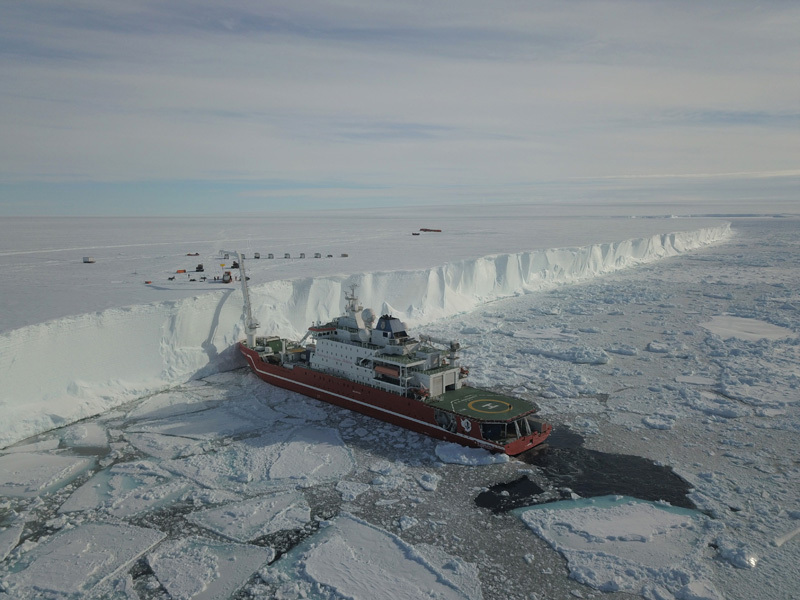The Association of Polar Early Career Scientists of South Africa provides researchers a unique opportunity to visit Antarctica aboard the SA Agulhas II. Photo: SANAP
When oceanographer Riesna Audh first saw the 40m icebergs in the Antarctic for the first time it was “awe-inspiring”. They dwarfed the SA Agulhas II, an icebreaker polar supply and research ship, which stands at about 12m high.
The PhD candidate at the University of Cape Town (UCT) has travelled to Antarctica more than four times aboard the SA Agulhas II, which is owned by the department of forestry, fisheries and the environment.
Applications are now open for early career scientists, naturalists and strong storytellers with a passion for polar research to join the Association of Polar Early Career Scientists of South Africa (APECS-SA). Applications close on 31 October.
The APECS-SA is the South African chapter of the global organisation APECS that helps young researchers network with each other and foster connections across polar sciences. These fields include studying the polar regions, which could include trips to Antarctica and Marion Island, according to the APECS.
“The main purpose is to create networks for those up and coming in polar research,” said Christel Hansen, a lecturer at the University of Pretoria and one of the founding members of the APECS-SA.
But joining the network of polar researchers does not ensure trips to polar regions, said Audh.
“Speaking from a privileged point of view because I’ve been able to go to Antarctica, seeing the sea ice was very formative for me,” said Audh. “I have always been fascinated by Antarctica and sea ice. These trips solidified my love for sea ice.”
The voyage to Antarctica
The journey from Cape Town’s V&A Waterfront to Marion Island — about 2 000km from Cape Town — takes about four days. The trip to the first stop in Antarctica takes another 10 days to two weeks, if the travel conditions are good, said Hansen.
Audh said that during almost every voyage, the SA Agulhas II met a storm within the first two days. “On my first cruise in June 2017, during the briefing from the captain and the beginning of the cruise you could see everyone turn different shades of green before you eventually climatise to the movement of the ship.”
There are two types of expeditions. The South African National Antarctic Expedition relief voyage (SANAE) takes place every summer to resupply the South African research base. Logistics are the priority, science is done opportunistically, either on the ground at the research base, or on the ship. The other type of expedition is a science-focused cruise that takes place during winter months.
 The Association of Polar Early Career Scientists of South Africa provides researchers a unique opportunity to visit Antarctica aboard the SA Agulhas II. Photo: SANAP
The Association of Polar Early Career Scientists of South Africa provides researchers a unique opportunity to visit Antarctica aboard the SA Agulhas II. Photo: SANAP
Research and networking
One of the largest South African projects in Antarctica is on space research at a base belonging to the South African Space Agency, said Hansen.
“It is a matter of pride for South Africans. It’s a long programme we should be proud of in the collaborative environment of polar research and climate change,” said Hansen. “Antarctica is a massive lab that helps us understand climate change better. It is so important because it does and will affect our lives.”
The ice that grows in these regions builds knowledge about climate change, said Hansen. Pointing to Antarctica’s “threshold area”, slight changes in temperatures have major effects, especially on animals in the way they migrate, move and colonise.
“The physics and biochemistry [of the ice] are important for the Southern Ocean and for our global climate and global system,” said Audh.
“Antarctica is a unique continent because it is not governed by a single country; no one owns it,” said Hansen. There is a lot of international collaboration, sharing of information and data. Antarctica is really important for researchers.”
The networking benefits of the APECS-SA for polar researchers has been useful for young researchers such as Audh, who said that as a UCT student, she met and collaborated with researchers from all universities in South Africa that she usually would not have.
“The research silos disappear once people are on the boat. The hierarchy of researchers that exists on land, does not exist on the ship. I met the APECS Germany head, which I never could have done before and that was really special,” said Audh.
Audh credits the APECS-SA committee for improving her methods of obtaining data and samples because there was only so much she could read from books. She said downtime on the ship is conducive to a lot of reading, introspection, and many games of Monopoly.
Early researchers can apply to the APECS-SA using this link.